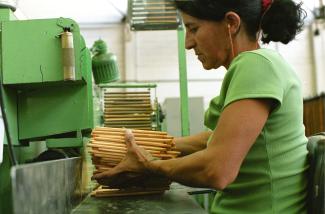Forestry
Sustainable use

The European Union is the largest importer of timber worldwide. According to the World Wide Fund for Nature (WWF), up to 19 % of that wood originates from illegal sources.
Maintaining tropical forests requires sustainable management in areas where resources are exploited and not only conservation areas. In other words, forests and forest lands must be used in a way:
- maintaining biodiversity, productivity, regeneration capacity and vitality while at the same time
- fulfilling relevant ecological, economic and social functions.
These criteria apply at the local, national and global levels. Other ecosystems must not be damaged either. Unfortunately, no definition of sustainable forest management is binding under international law so far.
The public sector is taking various measures against illegal logging. In 2003, the EU adopted an Action Plan on Forest Law Enforcement, Governance and Trade (FLEGT). A central part of FLEGT is entering into Voluntary Partnership Agreements (VPAs) with the governments of timber-rich countries. For exports to Europe, partner countries must establish a system to ensure timber is legal. They must issue a FLEGT licence to verify that the timber was harvested legally.
In March this year, the EU Timber Regulation came into force. It prohibits the import of illegally harvested timber or products made from it into the EU. The companies that first bring such goods onto Europe’s single market must provide evidence of legal sourcing. The EU accepts FLEGT wood as legal wood, but so far, none of its partner countries has a fully-operational licence system. Indonesia is most advanced in this regard. The EU helps partners to establish such systems and supports law enforcement.
To assess options for promoting sound forest management, Germany’s Federal Ministry for Economic Cooperation and Development (BMZ) hosted the conference “Forest for future generations – Public and private responsibility for sustainability” in Berlin in June. The participants came from all over the world and included representatives of public and private institutions.
Several of them warned that the legality in the timber sector is not the same as its sustainability. After all, companies may be destroying tropical forests even if they comply with existing laws. VPAs may therefore inadvertently lead to forest management that is in line with national legislation, but unsustainable nonetheless.
As there is not binding international definitions, partnership agreements lead to the introduction of sustainability criteria in partner countries. Jirawat Tangkijngamwong, the chairman of the Thai Timber Association, views VPAs as a great opportunity for improving matters.
In addition to national and supranational regulations, private-sector certification is important. The most widely used labels are those of the Forest Stewardship Council (FSC) and the Programme for the Endorsement of Forest Certification. The FSC standards are based on ten principles for sustainable forest management and certify forest operations and supply chains. The ten FSC principles include compliance with the national legislation, preservation of biodiversity and protection of the rights of indigenous peoples.
Credible certifications provide market benefits to businesses. Moreover, they help to ensure that illegal wood is kept out of international supply chains. Certification contributes to making sustainable forest management viable.
Many experts hope that, in future VPAs, the EU will put more emphasis on sustainability. In their view, the EU should include respective requirements in its Timber Regulation.
Co-regulation
Cristiana Pasca Palmer, from the EU Commission, emphasises that public and private measures can complement one another. Governments and the private sector can cooperate in three possible ways:
- Governments set legally binding sustainability goals and accept private-sector certificates for enforcement purposes.
- Private standards are adopted into national legislation.
- Governments can create regulatory frameworks that promote certification, or they can directly support the implementation of certification programmes (for instance by granting loans).
Legal regulations are democratically legitimate and enforced by authorities. The trouble is that they only apply to companies within a nation’s jurisdiction. Private standards, however, can apply internationally and thus serve as incentive for global business. Unfortunately, private standard-setting organisations have limited power to sanction non-compliance. Accordingly, it makes sense for governments and private initiatives to cooperate more closely.
Dirk Niebel, Germany’s Federal Minister for Economic Cooperation and Development appreciates such cooperation: “We must make better use of synergies between government regulations and private-sector initiatives to maintain tropical forests”, he said at the conference in Berlin. The goal is to set incentives for sourcing goods in supply chains with guaranteed legality and sustainability.
According to Kim Carstensen, the managing director of FSC International, co-regulation is already taking place. For instance, the FSC is adapting its standards to the requirements stipulated in the EU Timber Regulation and VPAs. In Cameroon, the FSC has incorporated VPA rules in its national standards. This is one way in which a private-sector initiative can contribute to improving law enforcement.
Tangkijngamwong, the forest expert from Thailand, appreciates the benefits of co-regulation. In his country, only a few large timber corporations can afford FSC certification, he says.
The EU is not the only important market for timber. Demand for wood is increasing fast in emerging markets with fast growing economies. Marcus Alves, the director of the Brazilian Forest Service, reports that most wood harvested in his country stay in the domestic market. Countries such as Thailand, Vietnam and China import large quantities of wood from tropical regions for manufacturing and construction purposes. Without a doubt, emerging countries must be involved in the international debate on sustainable timber trade.
Correct investments
Sustainable forest management is about more than merely timber. Forests provide what are known as ecosystem services by regulating the climate or providing food, for instance. The economic value of such services tends to be ignored. Sustainable forest management must safeguard them (see contribution on p. 380 ff.).
What is needed is convincing business models that generate revenues from ecosystem services. Such models have yet to develop. It is a challenge that financial institutions normally do not think in the long term. Trees, however, take decades to grow. At first glance, investing in ecosystem services and timber seems to provide lower returns over a longer period of time than clearing forests for agriculture or cattle ranches.
Tuukka Castrén of the World Bank points out that trees actually grow quite fast in tropical regions, so there is a potential for high returns. In his view, sustainable forest management is possible in tropical regions, but corruption, weak governance and legal uncertainty often stand in the way. These issues scare off well-intentioned investors.
Governments invest in forests too. While their investments tend to be small compared with those of the private sector, they can target their resources in ways that encourage private investors and corporations to engage in sustainable practices in tropical regions.
Niebel, is in favour of that kind of approach. He is proud of Germany having strengthened its commitment to preserving forests and other ecosystems this year. With an annual contribution worth € 500 million, Germany is one of the most important donors for the protection of forests and biodiversity worldwide. He says he wants the money to contribute to stemming the progressive loss of forests particularly in the tropics: “Tropical forests are essential to the well-being of future generations and a growing world population,” Niebel said in June.
Consumers also have an important role to play. The business community reports that wood and wood-based products from tropical countries have a bad reputation. Very few consumers know that illegal logging is not the main reason for deforestation; instead, that trend is mostly driven by the demand for agricultural land.
If consumers were made aware of the availability of products made from wood of certified sustainable origin, the public image of timber products would improve. Global supply chains should be made transparent, so wood resources can be traced to the forest of origin. EU member governments should set a good example in their procurement policies and by harmonising them.
Ulrike Haupt is the head of the BMZ division Environment and Sustainable Use of Natural Resources.
Birgit Joußen was a desk officer in the same BMZ division.
birgit.joussen@bmz.bund.de












